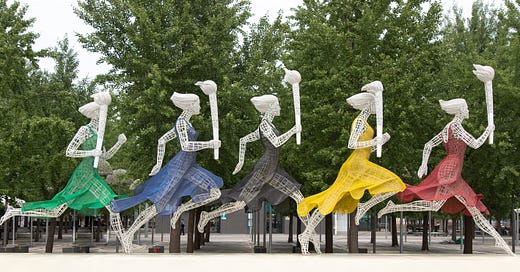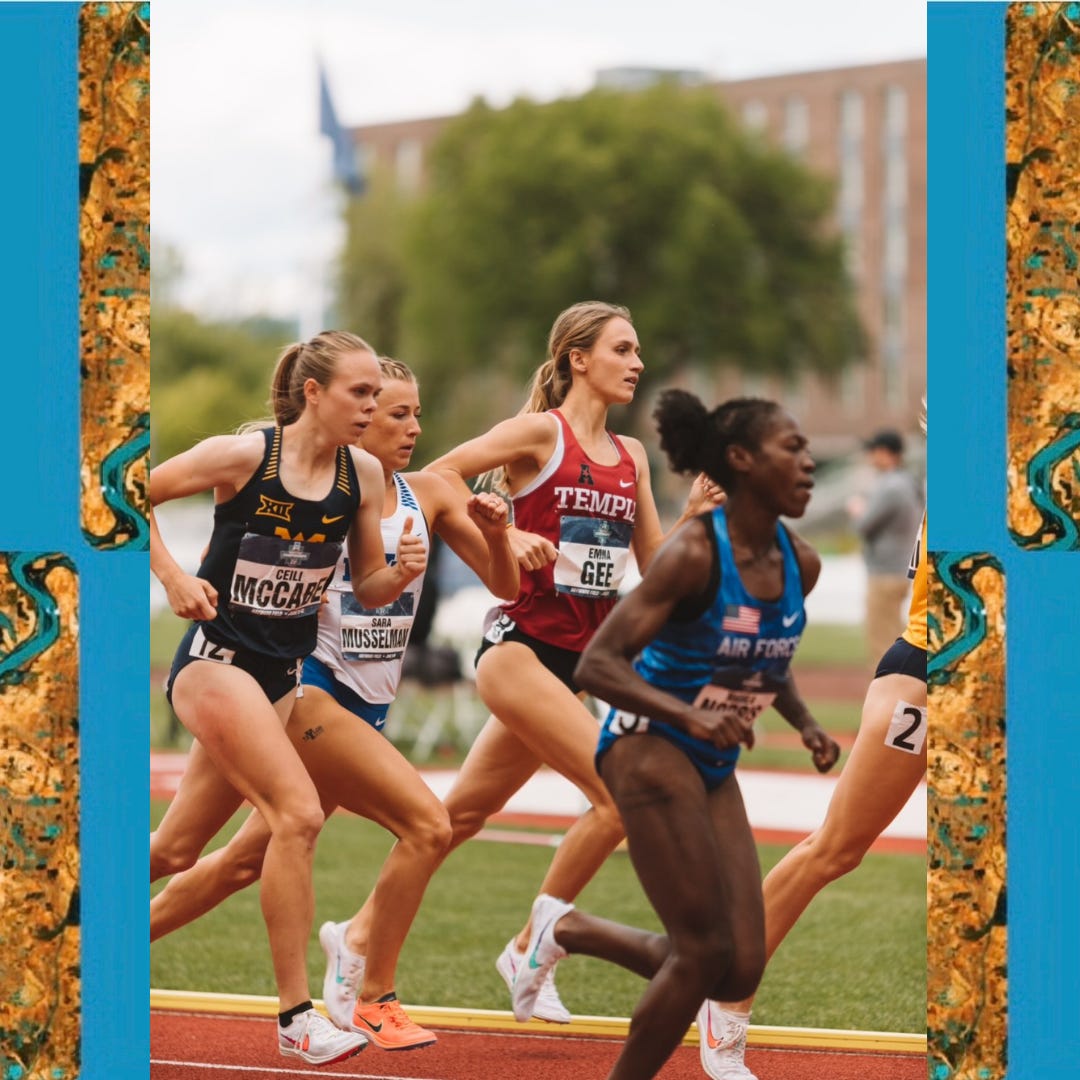“But I LOVE the Olympics!”
Yeah, me too.
And I’m not here to tell you that you can’t love the Olympics. There is something thrilling about watching the best of the best compete, and following their journeys en route to the most renowned athletic competition. There is something addictive about learning of speeds we did not know existed; of skills we never knew the human body could complete. There is something inspiring about the unity—the knowledge that people all around the world are watching this one athletic event and for the first time in four years, track nerds (like me) will be able to wear our full track nerdery on our sleeves, and all our normal-people friends who watch football and baseball might even know what we’re talking about.
Our love for the Olympics is natural. Human nature. Evolutionary, even. Of course we want to watch these genetic outliers do the seemingly impossible. We want to see what is possible for them. Or, more generally, for us.
But, the appeal is not just pure darwinism; it’s not only genes and survival. We love a good story, too. And what better story than the little girl who overcame childhood neglect and the trials of foster care and adoption to become the most decorated gymnast in the history of our country? Or the mother who endured a life-threatening pregnancy and fought Nike’s harmful maternity policies to return for her fifth Olympic games?
There are so many reasons to love the Olympics.

But let’s return to the unity piece of it. Can we truly argue for the unifying power of the Olympics when they un-house the poorest among us, disproportionately harm Black and Brown folks, and (in the case of 2021) amplify the affects of a global pandemic on one country and the most vulnerable people within it?
I am not saying that we all need to take to the streets and boycott the Olympics. Although, if that’s what you want to do, feel free. I am saying that it’s complicated. And no one has all the answers. I will say that the Olympics—as they exist today—are inherently harmful and unjust. If they are to continue for years to come, they will need a radical realignment.
The purpose of this newsletter is 1. to share some of the arguments and media surrounding the injustices held within the Olympics and 2. to tell you that IT’S OKAY. You can watch the games and support the athletes while reflecting on, having hard conversations about, and even fighting against, the injustices within them.
Learn more:
General injustices in the Olympics:
NOlympics LA is probably the most vocal group speaking out against the Olympics. While they are primarily focused on the 2028 LA Olympics, they also present strong arguments against the Olympics in general. You can read their full platform here, but I’ve dropped a couple quotes below:
“The Olympics have accelerated displacement and gentrification in every modern Games.”
“The Olympics threaten some of our most vulnerable communities: immigrants, the formerly incarcerated, sex workers, the homeless, the disabled, low income people of color, and so on. The Olympics also further criminalize homelessness and privatize public space. And in LA, they would strengthen the military apparatus and coordination that already exists.”
Two NOlympics LA organizers, Kendall Kaufman and Albert Corado, were on the Social Sport Podcast last fall.
Some people argue that infrastructure built for the Olympics will provide public benefits in the future, when that infrastructure is used again. However, the vast majority of the time, these buildings only causes the displacement of vulnerable people, and are never used after the Olympics. Take a look at these pictures of abandoned Olympic venues around the world.
The Burn it All Down podcast team has done a great job covering opposition toward the Tokyo games. They posted this interview with Anne Orchier of NOlympics LA. I would definitely recommend giving it a listen if you want to gain a better understanding of how the Tokyo Olympics will harm the most vulnerable, how COVID-19 heightens this harm, and how organizers in Japan (largely led by unhoused people) are pushing back.
Rules that disproportionately harm Black athletes:
Testosterone: Five Black women have been banned for natural testosterone levels: Caster Semenya, Christine Mboma, Beatrice Maslingi, Francine Niyonsaba, and Margaret Wambui. The cap on athletes’ testosterone levels in women’s events, a World Athletics Rule which went into effect in 2019, only applies to women competing in three events: the 400 meters, 800 meters, and mile. In other words, it was enacted to directly oppose Caster Semenya (who competes in the 800 meters).
I appreciated the following quote from this CBC article: “Mboma's and Masilingi's default hormonal settings are no more an unfair advantage than Kawhi Leonard's giant hands, or keen eyes in Major League Baseball, where the average player sees with 20/13 vision.”
Swim Caps: The IOC banned the use of the Soul cap, the swim cap made specifically for natural, Black hair. This ban is currently being fought by EU politicians.
Stupid substance bans:
Unless you’ve lived under a rock for the past three weeks, you know that Sha’Carri Richardson—a gold-medal favorite in the 100 meters—was banned for marijuana use. I don’t think I need to say anything else about this.
COVID-19:
In May, just as the fourth wave of COVID swept over Japan, organizers in Tokyo submitted a petition with 350,000 signatures, calling for cancellation of the Olympics.
This Sports Illustrated article outlines some of the public opposition towards the games from folks in Japan.

***Disclaimer Time*** These were just a few of the resources that I have found helpful when learning about, and reckoning with, the injustices held within the Olympics. Like everything in this newsletter, the above is far from comprehensive. The bottom line is that, despite our anger over the Olympics, we cannot lose sight of the athletes. These individuals have devoted years, if not their entire lives, to their sports. Each of them have fought against countless odds—from injuries to mental illness to sexual assault—to reach the pinnacles of their sports. While we might not be able to connect with their athletic prowesses, we can connect with their stories. We can connect with the fact that many of them are struggling to support themselves financially as they pursue their dreams. They each have families and hopes and fears and conflicting emotions. Some might ultimately oppose the Olympic Games and the harm they cause, too.
Episodes of the past month:
Lynn Mattix on Fund Her Tri and sharing the healing nature of sport
"𝗪𝗵𝗲𝗻 𝘄𝗼𝗺𝗲𝗻 𝗮𝗿𝗲 𝗹𝗼𝘃𝗶𝗻𝗴 𝘁𝗵𝗲𝗺𝘀𝗲𝗹𝘃𝗲𝘀, 𝘆𝗼𝘂 𝗰𝗮𝗻 𝘀𝗲𝗲 𝗶𝘁. 𝗪𝗲’𝗿𝗲 𝘂𝗻𝘀𝘁𝗼𝗽𝗽𝗮𝗯𝗹𝗲. 𝗜𝘁’𝘀 𝘄𝗼𝗻𝗱𝗲𝗿𝗳𝘂𝗹. 𝗜 𝗯𝗮𝘀𝗶𝗰𝗮𝗹𝗹𝘆 𝗷𝘂𝘀𝘁 𝘄𝗮𝗻𝘁𝗲𝗱 𝘁𝗼 𝘀𝗵𝗮𝗿𝗲 𝘁𝗵𝗮𝘁 𝘄𝗶𝘁𝗵 𝗮𝘀 𝗺𝗮𝗻𝘆 𝗽𝗲𝗼𝗽𝗹𝗲 𝗮𝘀 𝗽𝗼𝘀𝘀𝗶𝗯𝗹𝗲.” -Lynn Mattix.
Chris Mosier on the “Changing the Game” documentary and supporting transgender youth in sports
“𝗧𝗵𝗶𝘀 𝗶𝘀 𝗻𝗼𝘁 𝗮 𝗽𝗮𝗿𝘁𝗶𝘀𝗮𝗻 𝗶𝘀𝘀𝘂𝗲. 𝗔𝗻𝗱 𝘄𝗵𝗶𝗹𝗲 𝗶𝘁’𝘀 𝗯𝗲𝗲𝗻 𝗺𝗮𝗱𝗲 𝗼𝘂𝘁 𝘁𝗼 𝗯𝗲 𝗮 𝗽𝗮𝗿𝘁𝗶𝘀𝗮𝗻 𝗶𝘀𝘀𝘂𝗲, 𝗺𝘆 𝗶𝗱𝗲𝗻𝘁𝗶𝘁𝘆 𝘀𝗵𝗼𝘂𝗹𝗱 𝗻𝗼𝘁 𝗯𝗲 𝗽𝗼𝗹𝗶𝘁𝗶𝗰𝗮𝗹. 𝗧𝗵𝗲 𝗶𝗱𝗲𝗻𝘁𝗶𝘁𝘆 𝗼𝗳 𝘁𝗵𝗲𝘀𝗲 𝗸𝗶𝗱𝘀 𝘀𝗵𝗼𝘂𝗹𝗱 𝗻𝗼𝘁 𝗯𝗲 𝗽𝗼𝗹𝗶𝘁𝗶𝗰𝗮𝗹. 𝗪𝗲’𝗿𝗲 𝘁𝗮𝗹𝗸𝗶𝗻𝗴 𝗮𝗯𝗼𝘂𝘁 𝗯𝗮𝘀𝗶𝗰 𝗵𝘂𝗺𝗮𝗻 𝗿𝗶𝗴𝗵𝘁𝘀, 𝗱𝗶𝗴𝗻𝗶𝘁𝘆, 𝗿𝗲𝘀𝗽𝗲𝗰𝘁, 𝗮𝗻𝗱 𝗼𝗽𝗽𝗼𝗿𝘁𝘂𝗻𝗶𝘁𝘆—𝗹𝗶𝗸𝗲 𝗲𝘃𝗲𝗿𝘆 𝗼𝘁𝗵𝗲𝗿 𝗸𝗶𝗱 𝗵𝗮𝘀—𝘁𝗼 𝗽𝗹𝗮𝘆 𝘁𝗵𝗲 𝘀𝗽𝗼𝗿𝘁𝘀 𝘁𝗵𝗲𝘆 𝗹𝗼𝘃𝗲, 𝘁𝗼 𝗯𝗲 𝘁𝗵𝗲𝗶𝗿 𝗮𝘂𝘁𝗵𝗲𝗻𝘁𝗶𝗰 𝘀𝗲𝗹𝘃𝗲𝘀, 𝗮𝗻𝗱 𝘁𝗼 𝗵𝗮𝘃𝗲 𝗮 𝗰𝗵𝗶𝗹𝗱𝗵𝗼𝗼𝗱 𝗮𝗻𝗱 𝗲𝘅𝗽𝗲𝗿𝗶𝗲𝗻𝗰𝗲 𝗶𝗻 𝘀𝗰𝗵𝗼𝗼𝗹 𝘁𝗵𝗮𝘁 𝗶𝘀 𝗹𝗶𝗸𝗲 𝘁𝗵𝗮𝘁 𝗼𝗳 𝘁𝗵𝗲𝗶𝗿 𝗽𝗲𝗲𝗿𝘀. 𝗧𝗵𝗮𝘁 𝗶𝘀 𝗻𝗼𝘁 𝗮 𝗽𝗼𝗹𝗶𝘁𝗶𝗰𝗮𝗹 𝗶𝘀𝘀𝘂𝗲.” -Chris Mosier.
Emma Gee, first openly LGBTQ+ athlete at BYU, on the performance enhancing benefits of being your authentic self
“𝗠𝘆 𝗿𝗲𝗹𝗮𝘁𝗶𝗼𝗻𝘀𝗵𝗶𝗽 𝘄𝗶𝘁𝗵 𝗺𝘆𝘀𝗲𝗹𝗳 𝗶𝘀 𝘁𝗵𝗲 𝗺𝗼𝘀𝘁 𝗶𝗺𝗽𝗼𝗿𝘁𝗮𝗻𝘁 𝗿𝗲𝗹𝗮𝘁𝗶𝗼𝗻𝘀𝗵𝗶𝗽 𝗜’𝗺 𝗲𝘃𝗲𝗿 𝗴𝗼𝗶𝗻𝗴 𝘁𝗼 𝗵𝗮𝘃𝗲.” -Emma Gee
Zahra Alabanza on outdoor adventure for healing and Black liberation
“𝗜𝗳 𝘆𝗼𝘂’𝗿𝗲 𝗿𝗶𝗱𝗶𝗻𝗴 𝗮 𝗯𝗶𝗸𝗲 𝗳𝗼𝗿 𝗮𝗻𝘆 𝗺𝗶𝗹𝗲𝗮𝗴𝗲, 𝗹𝗲𝘁 𝗮𝗹𝗼𝗻𝗲 𝗹𝗼𝗻𝗴 𝗺𝗶𝗹𝗲𝘀 𝗼𝘃𝗲𝗿 𝗺𝘂𝗹𝘁𝗶𝗽𝗹𝗲 𝗱𝗮𝘆𝘀, 𝘄𝗵𝗮𝘁 𝘁𝗵𝗮𝘁 𝗱𝗼𝗲𝘀 𝗳𝗼𝗿 𝘄𝗵𝗼 𝘆𝗼𝘂 𝗮𝗿𝗲 𝗮𝗻𝗱 𝗵𝗼𝘄 𝘆𝗼𝘂 𝘀𝗵𝗼𝘄 𝘂𝗽 𝗶𝗻 𝘁𝗵𝗲 𝘄𝗼𝗿𝗹𝗱 𝗶𝘀 𝗿𝗲𝗮𝗹𝗹𝘆 𝗽𝗵𝗲𝗻𝗼𝗺𝗲𝗻𝗮𝗹.” -Zahra Alabanza
What I’m Writing:
As part of a trail access series for Trail Runner, I wrote about how gender and race interact to limit access to the trails.
This Trail Runner profile I wrote on Dinée Dorame, past Social Sport Podcast guest and host of the Grounded Podcast, is now available online.
For Hoka One One, I covered Adam Merry’s FKT attempt on the Mount Yale 360 trail with two articles: before and after his attempt. Adam is an awesome athlete to follow, and in general, the FKT is a niche pursuit that I’m excited to see get more press.
What I’m Reading:
“‘Cat Person’ and Me,” an essay in Slate by Alexis Nowicki. I remember exactly where I was when I first read the fictional story “Cat Person” in 2017. I think every young woman who read the story felt it. It was this gut-punch; this feeling of deeply relating. The recent essay is from a woman who realized that “Cat Person” was based off of her life. I appreciate how nuanced the essay is. It deals with the experience of noticing yourself in one of the most viral stories of all time. I think you can respect Nowicki’s essay while continuing to appreciate Kristen Roupenian (the author of “Cat Person”), her great work and talent, and the fact that most fiction is based off of something real.
I’ve read a lot of memoirs over the past year, but I think Ordinary Girls by Jacquira Díaz is in a league of its own.
What I’m Obsessed With:
Inside by Bo Burnham. Just watch the comedy special. Do it. It’s so incredibly funny but also kind of dark, and overall, just really well done. I’ve been listening to the associated album for the past month. I run to it, walk to it, write to it. Honestly, it’s gotten a little over the top.
Thank you for reading!!!
Social Sport is going on Summer Break! In other words, I will be biking long distances and running on trails and sleeping under the stars and less available via modern forms of communication for a couple of weeks. Yay for breaks and yay for adventures! Stay tuned for the next episode of the Social Sport Podcast, in mid-August.
In the meantime, you can subscribe to the Social Sport Podcast, and follow Social Sport on Instagram, Twitter, and Facebook. Feel free to slip into the Social Sport DM’s on Instagram, or send me an email at socialsportpod@gmail.com to let me know what you think of the show or newsletter!
Stay sporty & keep resisting,
Emma






